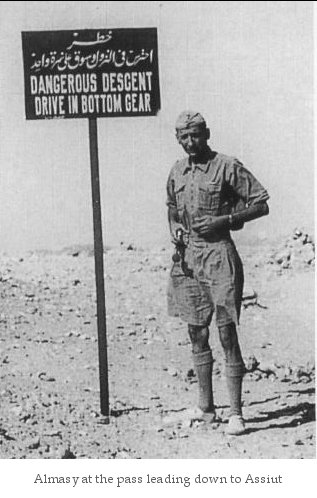An Abwehr officer who had developed an expertise regarding the eastern Sahara Desert, Laszlo Almasy was born in Borostyanko in western Hungary (now Bernstein, Austria) on 22 August 1895, the son of a nontitled lesser noble family. After studying in a boarding school in Great Britain and obtaining his first pilot’s license there, he served with the Austro- Hungarian air force during World War I. Afterward, he worked as a representative of an Austrian automobile company in Hungary. A drive along the Nile from Egypt to Sudan in 1926 whetted his interest in the area and led to repeated archeological expeditions and eventual residence in Cairo. With the outbreak of World War II, he had to return to Budapest, where he was recruited by Nikolaus Ritter of the Abwehr. Not only had the 1939 German translation of his book The Unknown Sahara come to the attention of Abwehr officials, but Almasy appeared convinced that a revolt against British rule might be sparked among a group of younger Egyptian military officers.
Government officials in Budapest further agreed to his temporary transfer from the Hungarian air force reserve to the Luftwaffe. After an initial briefing in Hamburg, he was given the rank of captain and assigned to Tunis as second in command of Ritter’s special unit. Later in Tripoli, Almasy advised the quartermasters of Erwin Rommel’s Afrika Korps about the topography of the Libyan desert, although Rommel turned down his request to lead a German battalion to Upper Egypt. The initial plan to spark a rebellion in the Egyptian army had to be abandoned when the key figure, General Aziz el Masri, failed to materialize at the prearranged spot. When two subsequent attempts by Ritter to infiltrate agents into Cairo misfired, he transferred the command to Almasy.
According to the revised directives of Operation Salaam, agent John Eppler and radio operator Hans-Georg Sandstede were to be transported by automobile through enemy-held desert terrain by a seven-man team headed by Almasy. Despite encountering a number of obstacles, the mission fulfilled its objective, and Almasy was promptly promoted to major and awarded the Iron Cross First Class by Rommel himself. The sequel, however, proved to be a double disappointment. In September 1942, Eppler and Sandstede were arrested in Cairo by the British, while Rommel showed no interest in Almasy’s plans for a unit specializing in unconventional warfare.
In summer 1942, suffering from an acute form of amebic dysentery, Almasy left North Africa for medical treatment in Nazi-occupied Athens. The following year, after his return to Budapest, his brief memoir of the North African campaign-Rommel seregenel Libyaban (With Rommel in Libya)-appeared, although it had been heavily edited by the Abwehr and made no mention of Ritter or Operation Salaam.
At the end of the war, Almasy served briefly as a translator for the occupying Red Army but was soon imprisoned and interrogated at length by the NKVD (Soviet People’s Commissariat of Internal Affairs). Even though his trial for wartime treason in the communist People’s Court resulted in an acquittal, rumors circulated that he had conveyed information about Soviet military movements to MI6 via a clandestine radio, and he was rearrested two months later. British intelligence, working with a senior Egyptian official, assisted in his escape from prison and eventual return to Cairo. Hardly had King Farouk named him the director of the new Cairo Desert Institute than his fragile health took a decided turn for the worse. Treatment at a hospital in Salzburg, Austria, was to no avail, and he died there on 22 March 1951.
SALAAM
An Abwehr operation in Egypt during World War II, salaam had the objective of sending information to General Erwin Rommel’s Afrika Korps and installing an agent of influence in Cairo who would help ignite an anti-British revolution. Under the leadership of Laszlo Almasy, a hazardous 1,700-mile automobile expedition across the northern Sahara Desert brought agent John Eppler (code name kondor) and radio operator Hans-Georg Sandstede to the Egyptian capital in early May 1942. The capture of a radio operator in Rommel’s headquarters by a New Zealand desert patrol led to their arrest and conviction three months later.
JOHN EPPLER, (1914-?)
An Abwehr operative involved in Operation Salaam, John Eppler was born in Alexandria, Egypt, the adopted son of a judge, Gaafer Pascha. Joining the Abwehr following the advent of the Third Reich, he received the wartime assignment of collecting information in Cairo and trying to foment an anti-British revolution as outlined in Operation salaam. Yet only months after reaching the Egyptian capital via a hazardous 1,700-mile desert journey led by Laszlo Almasy, both he and his radio operator, Hans-Georg Sandstede, were arrested and tried by the British in July 1942. Their death sentences, however, were not carried out, and both men were released on 17 July 1946. Subsequently, Eppler wrote his memoirs-Geheimagent im II. Weltkrieg: Zwischen Berlin, Kabul, und Kairo (Operation Condor: Rommel’s Spy)-and attempted unsuccessfully to retrieve his unpaid Abwehr salary from the Federal Republic of Germany in 1971.
